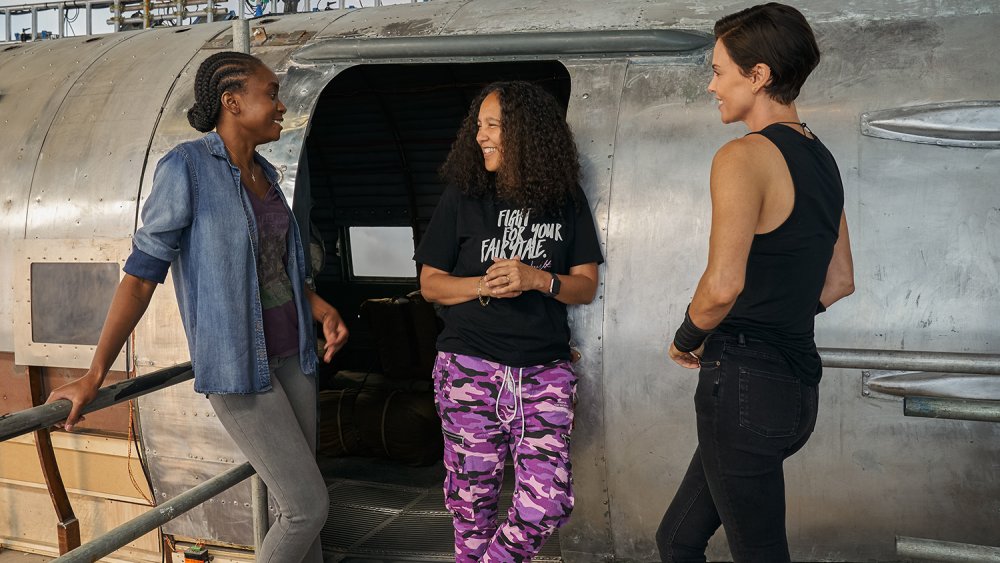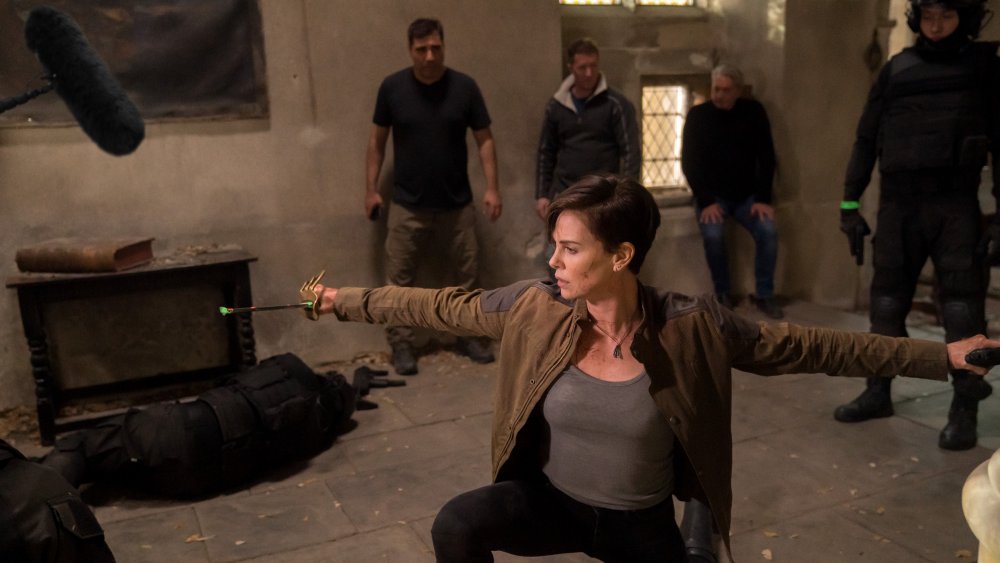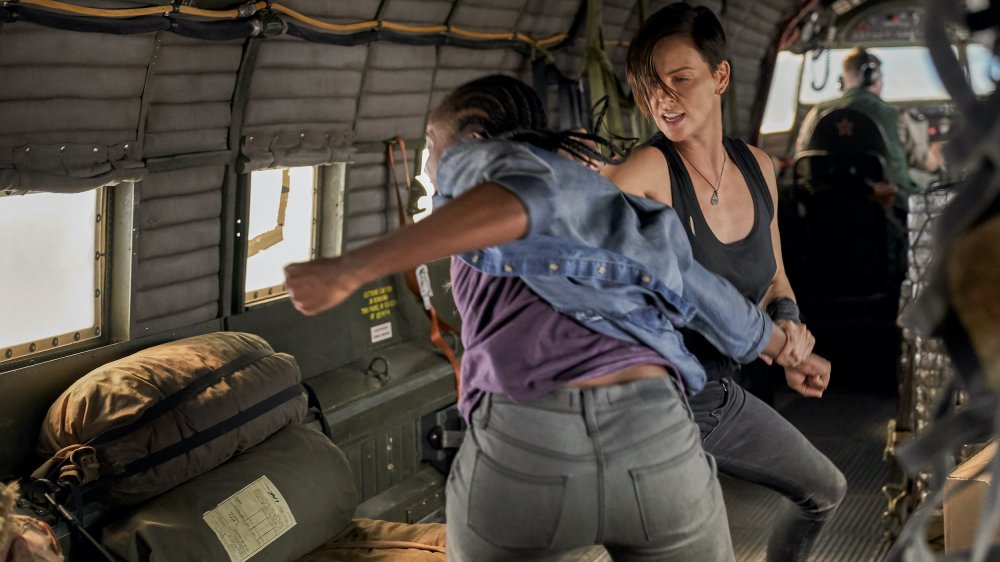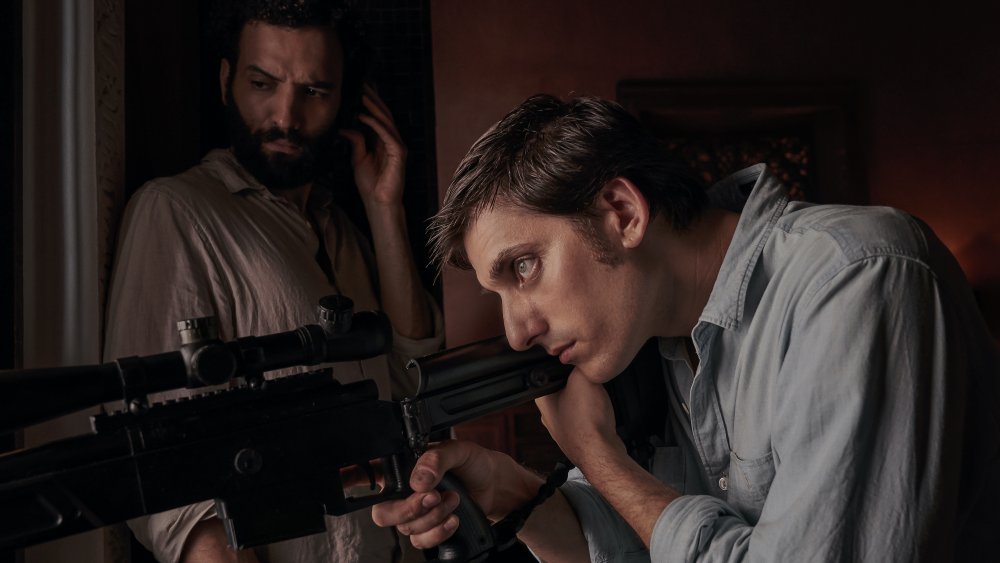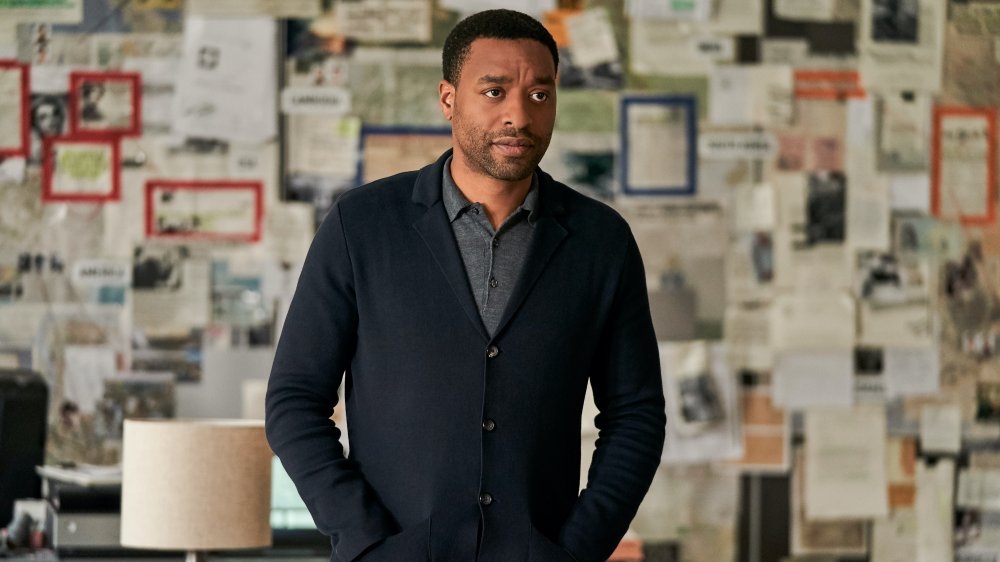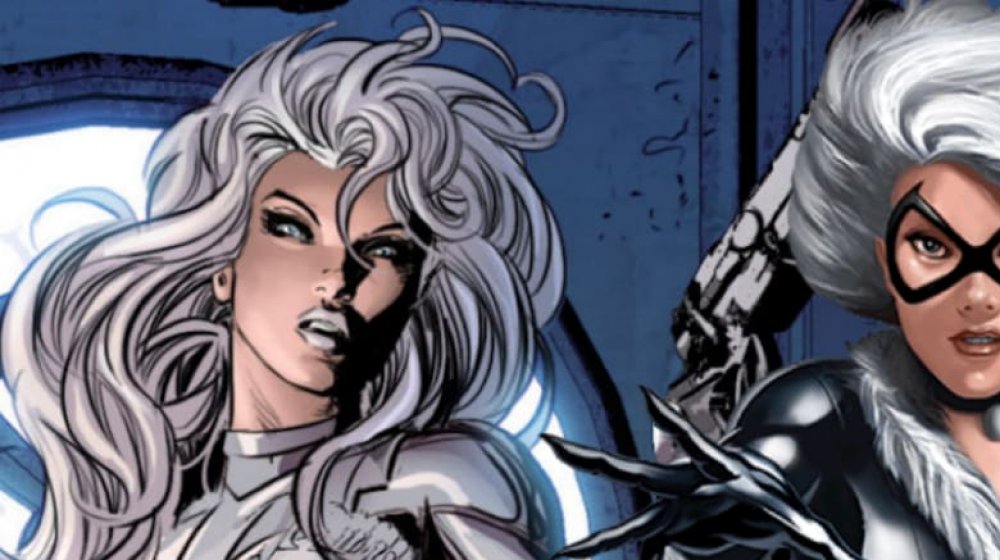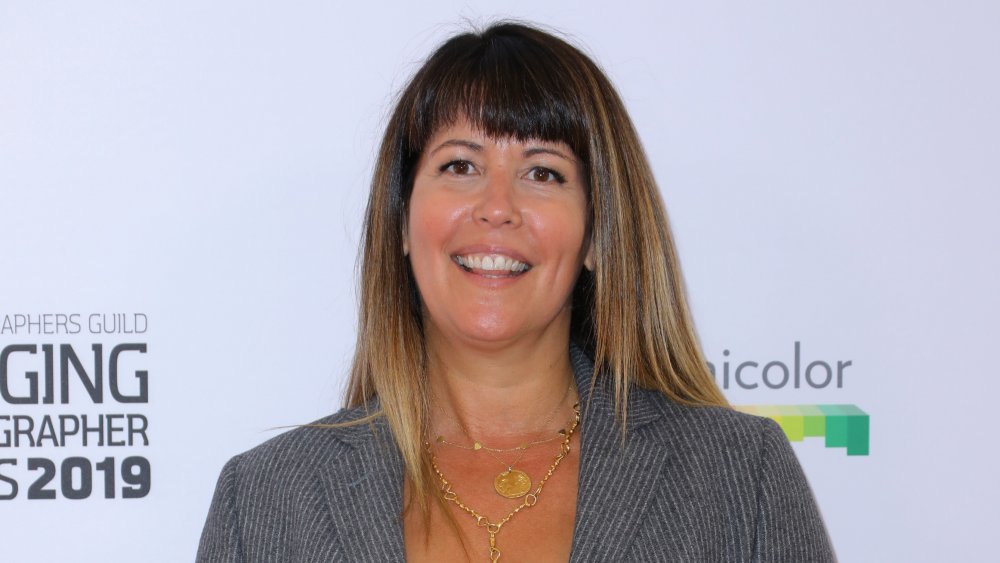Gina Prince-Bythewood On The Old Guard - Exclusive Interview
Gina Prince-Bythewood has long been best known as the writer/director behind acclaimed dramas like Love & Basketball, but as an action movie fan, she's been eager to have the chance to prove her chops in that genre as well. With the Netflix hit The Old Guard, she achieved that goal — and became the first black woman to direct a comics-derived action adventure in the bargain. With movies like The Raid and the bathroom fight scene between Henry Cavill and Tom Cruise in Mission: Impossible – Fallout as her templates, Prince-Bythewood got to work with Charlize Theron, KiKi Layne (If Beale Street Could Talk), and the rest of the movie's ensemble to craft a tight and engaging action epic.
In this exclusive Q&A, Prince-Bythewood talked with Looper about the challenge of directing action sequences that feel gritty and real, what made her interested in directing something she didn't also write, representation in Hollywood films, the status of Marvel's Silver Sable and Black Cat projects, and more.
How Gina Prince-Bythewood came to direct her first action film
My favorite scene, in terms of fight choreography, was the one between KiKi Layne and Charlize Theron in the airplane. And then I come to find out that it was the first of the fight scenes you shot for the movie.
No, the first scene that we shot in the entire movie.
Wow.
Yeah. Go big or go home.
Directing your first big-budget action movie like this, with an A-list Oscar-winning star, how difficult is it to get the insurance people and all of the bean counters onboard with letting you do that?
Well, it really started with Skydance [Media]. Skydance reached out to me. They had the rights to this graphic novel, and they had developed the script with [comic book writer] Greg Rucka for a year and were very intentional on wanting a female director for it. And the amazing thing is, given how few women get this opportunity — and it's so often that we don't get the opportunity because we haven't shot action before, but how do you get to shoot action if you're not giving us the action scenes? So it's just this ridiculous thing. But Skydance reached out to me because they loved Love & Basketball and they loved Beyond the Lights and they wanted what I do with character and depth of story. They wanted that in The Old Guard, so that it would feel like an action drama, as opposed to just the drama in that. I mean that made it such a warm room. And that's the thing. We just want the opportunity to get into the room. Then we can show you what we can do. I love action. And I had specific ideas of what I wanted to do, how I wanted to shoot it, how I can make it feel grounded, and real.
My template, my bar, was the bathroom fight in [Mission: Impossible – Fallout]. It was perfect. It was the perfect fight scene. So that was my template. And the way I talked about it, they saw my passions and trusted me. And that was a big deal. It wasn't a leap of faith because I haven't obviously done something of this scale before, but I came in with a swagger and confidence because I did believe I could do it. And I wanted to do it for so long. And I knew that I wanted to bring some of my collaborators that have gotten me to this point, but also surround myself with great people who have done it, like [fight coordinator] Danny Hernandez. Danny, Jeff Habberstad, and Brycen Counts, that team were so great. I swear almost every day I would say to myself, what would have happened if I have a crappy stunt team? It's scary. Because they are so integral to the process.
Why Gina Prince-Bythewood shot The Old Guard's most difficult fistfight first
I love the realism, which brings me back to the close quarters fighting in the plane. I mean, you had to have cameras fit in that airplane, too. What were some of the unique challenges of that?
Oh, there were many. But you know, it's funny, we did decide to start with that. And I did have some trepidation there. In that it's so important, for any director, but even more so for a female director and a female director doing an action film, you have to set the tone early. The crew needs to know you know what you're doing. I obviously formed great relationships during preproduction, but it really is that the proof is in the pudding in one weekend on set. Can she handle this? So first I really was like, "Maybe we should start with two people at a table." Like, I know I can do that really well, but as we thought about it, the actors had been training for months, learning the specific choreography. To take a break and shoot some stuff and then come back to it, how much would they have forgotten? It just felt right to just go straight in from training right into the scene. I felt like it would set the tone given that we're starting so big, starting with a scene between these two actors who needed to build a trust in a relationship. And there's not a better way than two actors throwing punches at each other.
The physicality involved in that whole sequence, to start with that, is really great to bring two actors together. And you know, those dramatic scenes, the intimacy that they're going to need has already been established through going through that grueling part, together.
Yeah. And the trust. I knew I wanted every action sequence to have a story to it, to have it be character-driven, to have it be emotional. And that meant I needed the actors really doing it as opposed to me trying to cut around stunt doubles to get that. So those were early conversations, obviously, with the actors and what it would take, how hard they would need to work to embody these characters. But then talking with Danny and the rest of the team about training them, trusting that they would get them to where they needed to be, so that the sequence could be really good because for me, a woman, an athlete, I know what good fighting looks like.
I want them to be athletic. I cannot put women up onscreen that look whack. Because that's so personal and the actors put in that time. So I knew that they had it. So now how am I going to shoot it and tell the story? And it's two people in a confined space. The DP, Tami Reiker, and I, we decided early on, let's not give ourselves that crutch of building walls that could slide so that I could put the camera anywhere. Let's be as confined and restricted as the characters. I felt like it would bring us more into the fight. We went handheld, [nearly] the whole film is handheld, [about] 80% of it is handheld. And we were shooting with 65mm cameras, which hadn't been done on that scale before, because they're very heavy cameras. But I had long talks with my two great camera guys letting them know, and they were up for it. They did get massages every week, but they were absolutely up for it.
I wanted everything or most things at eye level as opposed to shooting from down below or shooting up high. I wanted to feel like we are capturing the action in the moment, getting the feel in the body slams against the walls and into the floors. But more than that, tell the story of Nile's rage and fear and growing frustration, because she can't touch this woman. She is using her martial arts training that she learned in the Marines. It's not working. As the frustration grows, she kind of tosses that out the window, kind of goes back to street fighting and just throwing these wild haymakers. Whereas Andy, who knows every fighting style –
For thousands of years!
I know [laughs]. So just testing Nile, testing this new immortal. What does she have? And then Nile gets that one shot in, [a] cheap shot, and suddenly she gets some swagger, and Andy's impressed. "Damn, this girl got a shot in on me." And then Nile gets another shot. And then Andy, once again, "Ok, let me shut this down." But it also shows Nile doesn't give up. She gets her arm broke, but she still keeps coming. I love what it said about Nile's character in that fight. I love the playfulness that Andy brought to it, of the testing and the teasing and in some parts, the humiliation. When she grabs her face, and walks her back? I wanted that humiliation. So, it was fun to put all those character things into the fight, but also have these two women truly fight, not as a sexy cat fight, but as a fight. Two warriors, two athletes fighting. And that was honestly what was so important to me.
What drew Gina Prince-Bythewood to The Old Guard specifically
You tend to write everything that you direct. What it was that grabbed you about The Old Guard in particular to where you were like, "Okay, I can tell this story and put my unique stamp on it. It doesn't have to be my script." What was it about this that made you choose it?
Yeah, I mean, it is interesting. I have written almost everything that I've directed and there's something really special about that, because it's a hundred percent [my] vision and writing I'm actually directing.
This, when I read the script, it hit that guttural thing that I often get where I will, I always get when I write.
So many of the things within the story are things that I wanted to bring to the genre when I got the opportunity. The fact that it was two females at the head of it, and one was a young black female. The theme of these characters trying to find their purpose, losing their purpose, always questioning the why, was something so personal to me.
And the Joe [Marwan Kenzari] and Nicky [Luca Merinelli] characters and their storyline, which felt so different and fresh and reminded me, in the same way that I want to see myself reflected as a hero, everybody deserves to have that. So it's not only that these two gay characters get to be heroes, but also Joe's character, who's Middle Eastern. And obviously in Hollywood [Middle Eastern people] have been so demonized but yet here, he gets to be a hero. It just felt like it reflected the world that I want to see. But it felt really organic. It didn't feel forced at all. And it shouldn't, it should just feel natural and it just felt effortless.
And the story kept surprising me. I really loved it. I wasn't familiar with the graphic novel before I read, but I was familiar with Greg's work because Lazarus was something I researched for Silver & Black. I loved his writing. I loved that I cared and was moved by the characters in the same way that I was excited by the action and the set pieces. And that just felt like a really beautiful balance that I would have hopefully had the talent to write myself.
The butterfly effect in The Old Guard
I love what you said about it not being forced too, because the story convention provides for a way that these very diverse people would find each other, over literal centuries. So it doesn't feel like a ragtag diverse crew assembled for the sake of it. It's got a very organic, like you said, vibe to it.
Yeah, absolutely. One more thing in terms of the connectivity for me, that's the other thing. There was a short story written by Ray Bradbury [A Sound of Thunder], that I read when I was like 11 years old that has never left me. And there's a famous story about somebody who goes back in time and you're told that you can visit, but you can't go out, off the path. But this guy goes off the path, then he gets back to the present day, and the entire world is different. And he can't figure out what happened. Then he looks at the bottom of his shoe and there's a dead butterfly.
The so-called "butterfly effect."
Yeah. That one thing affects the world. I've always been mesmerized by that. And so, when I read this, the story is these warriors who have affected humanity in both small and huge ways by saving one person that centuries later, birthed someone else that did something great for the world. I so love that conceit.
Yes! And it's some great visual storytelling when you see that spread Copley has on his wall for the first time.
Yeah, the sociograms.
Marvel's Silver & Black
You mentioned Silver & Black. I'm a Marvel Comics person, as are most people in the world now. With The Old Guard, you're the first black woman to direct a comic book film. But it was almost Silver Sable and Black Cat before that. I was happy to hear that idea has been broken apart now, that each character will get her own vehicle. And you are still onboard as a producer on those, right?
Yeah. The thing is, I've been off of it for two years, enveloped in Old Guard, so at some point, absolutely, we'll reengage.
And I'm not sure, all I know is, yes, they want to divvy them up. It's interesting that you said what you said. I actually loved the two together and the script that I wrote, I thought was really dope [laughs].
It's not that I don't want them together, it's more that I like the buildup of the movies apart and then the movie together.
That is true. Give them each their [own] shine and then bring them together.
The advice Gina Prince-Bythewood got from Wonder Woman director Patty Jenkins
While prepping for The Old Guard, you met with Patty Jenkins. What can you tell me about that?
Oh, Patty has been so great. I met with her a couple of times, actually, first when I got Silver & Black. And then met two more times with The Old Guard. It was great because she was actually in London doing post on Wonder Woman when I was in preproduction for The Old Guard. So to be able to talk to someone who has been through it is a really big deal, and it's not just the technical things that she gave me a heads up on, like viz effects and things like that, but also the toll.
I mean, it's a big deal to shoot 63 days, to be in prep for months. I was in London for nine and a half months and that is a different thing than coming from Beyond the Lights, which is 33 days, you know? It takes incredible stamina. And just little things that she told me to look out for to protect yourself in that were really, really helpful. And even more than that, how excited she was that I had this opportunity and believing in me. And that means a lot, given the amount of pressure that you have on you when you take on something like this.
In terms of the Bechdel test — does this movie feature a scene where two women discuss something other than a man — that's like this whole movie! I appreciated that a lot. It wasn't forced, either.
Aw, I love that you noticed that. And yeah, I hope that we get that stamp.
Thank you so much for making the time. I can't wait to preach the gospel of this movie to my friends.
I love that. Thank you so much. This has been fun.
